The AMD Ryzen Threadripper 3960X and 3970X Review: 24 and 32 Cores on 7nm
by Dr. Ian Cutress, Andrei Frumusanu & Gavin Bonshor on November 25, 2019 9:05 AM ESTCPU Performance: Encoding Tests
With the rise of streaming, vlogs, and video content as a whole, encoding and transcoding tests are becoming ever more important. Not only are more home users and gamers needing to convert video files into something more manageable, for streaming or archival purposes, but the servers that manage the output also manage around data and log files with compression and decompression. Our encoding tasks are focused around these important scenarios, with input from the community for the best implementation of real-world testing.
All of our benchmark results can also be found in our benchmark engine, Bench.
Handbrake 1.1.0: Streaming and Archival Video Transcoding
A popular open source tool, Handbrake is the anything-to-anything video conversion software that a number of people use as a reference point. The danger is always on version numbers and optimization, for example the latest versions of the software can take advantage of AVX-512 and OpenCL to accelerate certain types of transcoding and algorithms. The version we use here is a pure CPU play, with common transcoding variations.
We have split Handbrake up into several tests, using a Logitech C920 1080p60 native webcam recording (essentially a streamer recording), and convert them into two types of streaming formats and one for archival. The output settings used are:
- 720p60 at 6000 kbps constant bit rate, fast setting, high profile
- 1080p60 at 3500 kbps constant bit rate, faster setting, main profile
- 1080p60 HEVC at 3500 kbps variable bit rate, fast setting, main profile
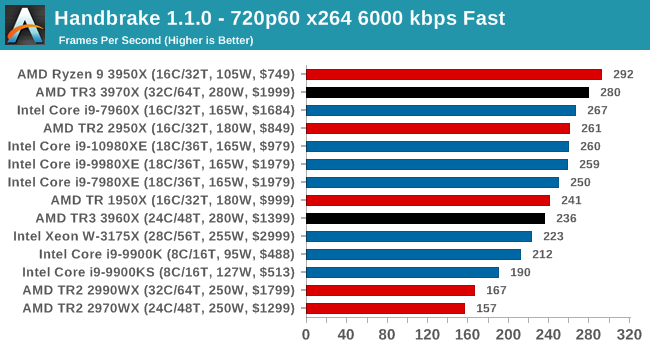
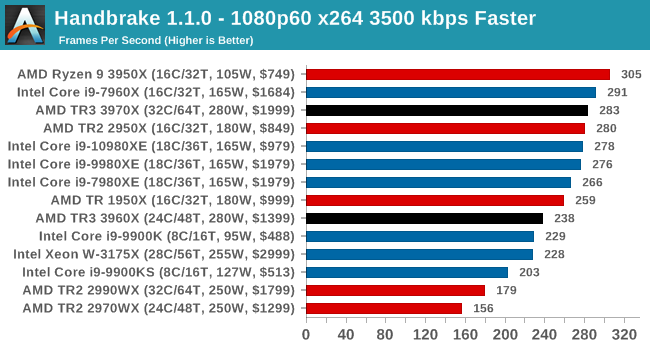
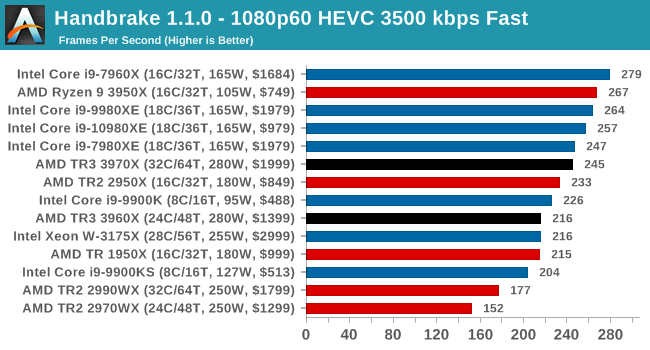
Video encoding is a little varied, based on the variable threaded nature. Certain encoding tests can be more memory sensitive here, or accelerated in different ways, or not scale well with more cores. Either way, TR3 performs a lot better than TR2, but the 3950X seems the best choice.
7-zip v1805: Popular Open-Source Encoding Engine
Out of our compression/decompression tool tests, 7-zip is the most requested and comes with a built-in benchmark. For our test suite, we’ve pulled the latest version of the software and we run the benchmark from the command line, reporting the compression, decompression, and a combined score.
It is noted in this benchmark that the latest multi-die processors have very bi-modal performance between compression and decompression, performing well in one and badly in the other. There are also discussions around how the Windows Scheduler is implementing every thread. As we get more results, it will be interesting to see how this plays out.
Please note, if you plan to share out the Compression graph, please include the Decompression one. Otherwise you’re only presenting half a picture.
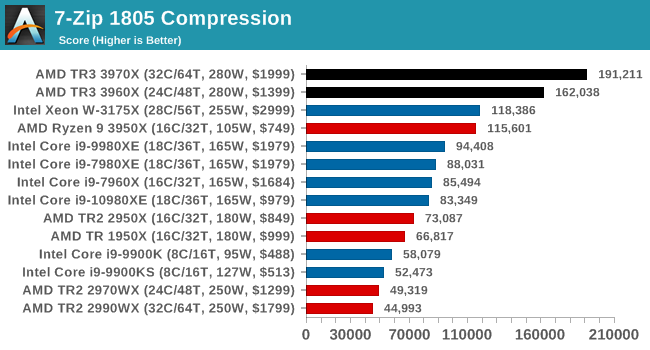
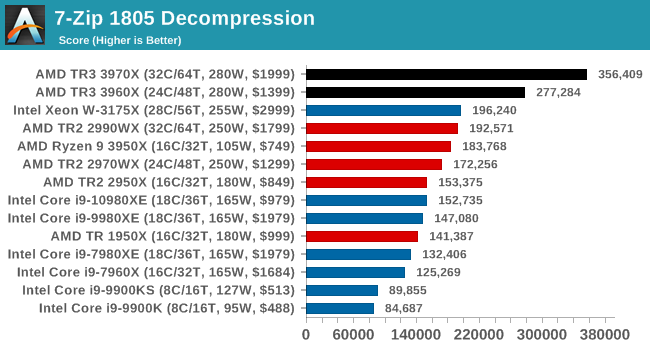
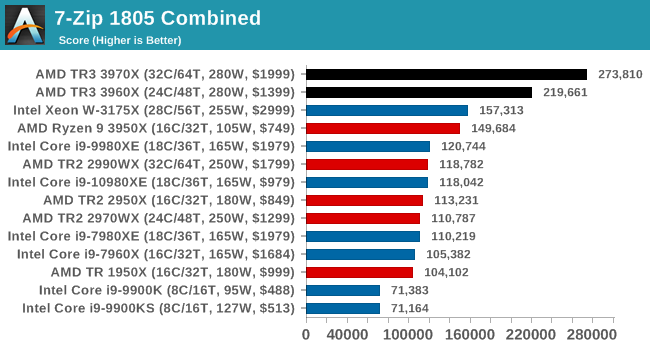
Easily parallel puts the TR3 well ahead of TR2 and Intel.
WinRAR 5.60b3: Archiving Tool
My compression tool of choice is often WinRAR, having been one of the first tools a number of my generation used over two decades ago. The interface has not changed much, although the integration with Windows right click commands is always a plus. It has no in-built test, so we run a compression over a set directory containing over thirty 60-second video files and 2000 small web-based files at a normal compression rate.
WinRAR is variable threaded but also susceptible to caching, so in our test we run it 10 times and take the average of the last five, leaving the test purely for raw CPU compute performance.
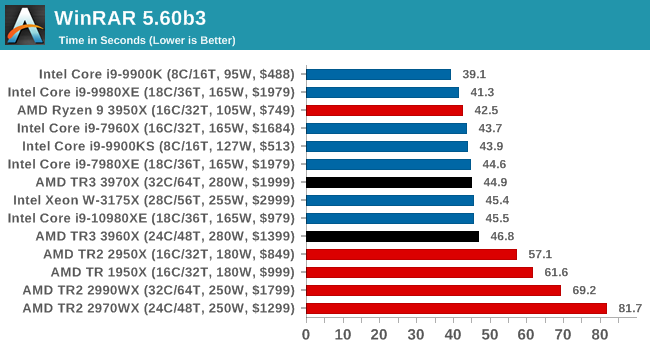
WinRAR is a variably threaded application, and both TR3 processors perform in the same ballpark as anything from Intel. Ideally we should have seen them streak ahead, but we seem to be at a point where CPU frequency or core counts are the limiting factor. At least with Zen 2, there are no issues as there was with Zen 1/Zen+.
AES Encryption: File Security
A number of platforms, particularly mobile devices, are now offering encryption by default with file systems in order to protect the contents. Windows based devices have these options as well, often applied by BitLocker or third-party software. In our AES encryption test, we used the discontinued TrueCrypt for its built-in benchmark, which tests several encryption algorithms directly in memory.
The data we take for this test is the combined AES encrypt/decrypt performance, measured in gigabytes per second. The software does use AES commands for processors that offer hardware selection, however not AVX-512.
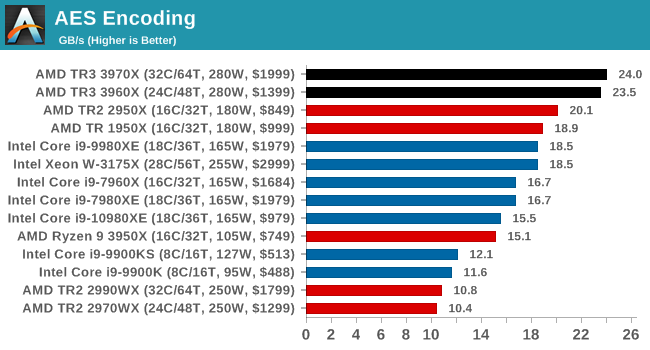










245 Comments
View All Comments
Xyler94 - Tuesday, November 26, 2019 - link
Gotta love the "But what about this" with you fanboys.Did AMD beat Intel to the X86-64 Race? Yes
Did AMD beat Intel to the 1Ghz Race? Yes
Did AMD beat Intel to the true dual-core arc? Yes
Does AMD still continue to innovate and bring us better products, despite their peanut funding compared to Intel, while Intel just tries to weasel their way through the market? Of course. Do you honestly believe if TR3 wasn't so amazing, that Intel would have reduced their 18 core part to 1k out of the goodness of their heart? If you think that, you're more of a fanboy than I thought.
It is still known as AMD-64 today, because AMD found the way to do both 32bit and 64bit X86 at the same time, and Intel has to license that tech from AMD. Without AMD, Intel would not be releasing 8 core CPUs today. The reason for their shortages isn't really due to high demand, it's due to varying demand of their products. the 6-8 core silicon is different from their 4 core ones, and they needed to manufacture separate LCC and HCC core i9/Xeons, further hogging their supply chain. And there's also the fact the 9900k is also a legitimately great CPU, so people want it, further hurting the supply chain. Intel did this to themselves due to years of complacency, so I don't feel bad at all.
blppt - Wednesday, November 27, 2019 - link
"Did AMD beat Intel to the X86-64 Race? Yes"They didn't beat Intel to anything---Intel was going with IA64, never going with x64, Then AMD threw a MASSIVE wrench into those plans, lol. Intel was forced to then copy AMD64 with EMT64 when Itanium flopped.
But make no mistake---if AMD didn't create x86-64, Intel wouldn't have either. We'd all be running Itaniums and Itanium clones.
Qasar - Wednesday, November 27, 2019 - link
actually, for the most part, the industry didnt want ia 64, it would me a redo of most, if not all of the software just to use it, before they could even use it, with AMD64, you could keep using existing 32 bit software, and transition of 64 bit, when you can, or wanted to. amd just found a better, and quicker way to 64 bit then when intel was trying to cram down every ones throats."
But make no mistake---if AMD didn't create x86-64, Intel wouldn't have either." and chances are, we could be still using 32 bit cpus, as i said above, most, if not all of the industry didnt want to have to re compile all of the software we used then. and wasnt itanium slower then x86 over all ?
ahh yep.. it was slower : " By the time Itanium was released in June 2001, its performance was not superior to competing RISC and CISC processors. " from https://en.wikipedia.org/wiki/IA-64
Qasar - Wednesday, November 27, 2019 - link
would me a redo of most = would mean a redo of mostblppt - Monday, December 2, 2019 - link
One of the big reasons Itanium/IA-64 failed was that its "backwards compatibility" (i.e. x86 emulation) was much slower than the native x86 cpus out at the time.So, while they wouldn't need to redo all that x86 software, it wasn't exactly speedy while emulating.
To take full advantage of the IA64 architecture, yes, they would need to rewrite a lot of software, but it would have *run* without a rewrite.
And that's where x86-64 stepped in. 64 bit memory addressing, perfect x86-32 performance at a lower price.
But Intel was never going to create x64 by themselves unless the new EPIC/VLIW IA64 hit some kind of performance brick wall, or people just kept coding to x86 anyways (which Itanium would run, but slowly).
Bear in mind that part of the reason it was slow in 2001, x86 and Power had been extensively optimized compilers for a decade (or more for x86) and IA64 was in its nascent stages. Since it was never adopted by the mass public (include home users, etc), development of IA64 never came close to the level of development and optimization of x86.
Qasar - Tuesday, December 3, 2019 - link
either way you look at it, it seems AMD is doing more to move the cpu farther, then intel does. AMD seems to be the one that innovates, while intel sleeps. i know some who is a fan of intel, will refute this, but think about it... AMD improves the cpu, and moves it forward, while intel stagnates and stifles it..eva02langley - Monday, November 25, 2019 - link
Desktop and HEDT is not Intel business anymore. Just a matter of time for server and laptop to eat the same bullet.eek2121 - Monday, November 25, 2019 - link
I wouldn't say that AMD fans are wrong. Look at AMD's revenue years ago vs today. Do you think the growth came out of thin air? No, AMD is eroding Intel's marketshare. It hasn't begun to show yet, because the last reported earnings did not include Zen 2 eating into things. More and more people are buying AMD, and as long as AMD continues to execute as they have (and even more so: they have to get into bed with OEMs), Intel will gradually begin to suffer. They already HAVE suffered. Drastic price reductions on their highest end parts.eek2121 - Monday, November 25, 2019 - link
Oh and I should add that Intel is in a lot more markets than AMD. In addition, Intel actually does a ton of fab work for other companies. Intel makes networking cards, storage, and much more. So in translation: Revenue is meaningless. Intel does not have endless amounts of cash to throw at creating new CPUs, GPUs (which are coming out in 2021), and chipsets. What matters is marketshare. For Intel, it's shrinking.tygrus - Tuesday, November 26, 2019 - link
AMD have taken market share from Intel but it's not uniform across all markets. Fancy brand names, servers and ultra notebooks are still dominated by Intel and where the end-user isn't making a choice. Enthusiasts using a local store to select parts & assemble are a small market that have swung to AMD.